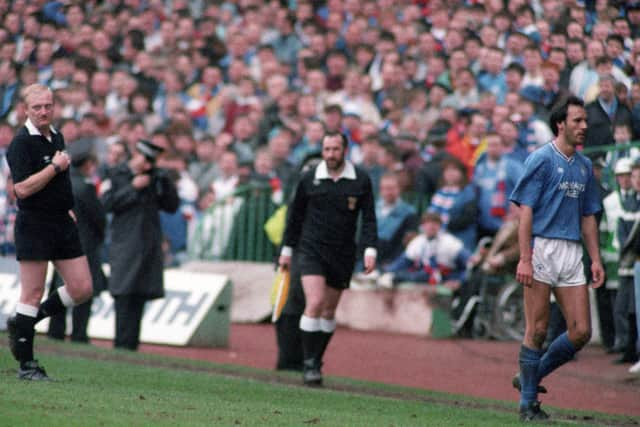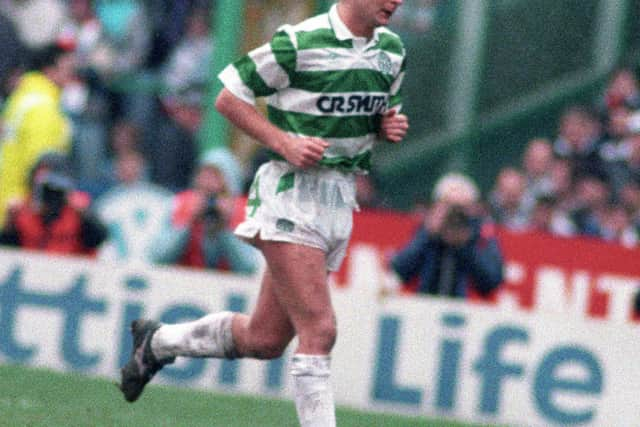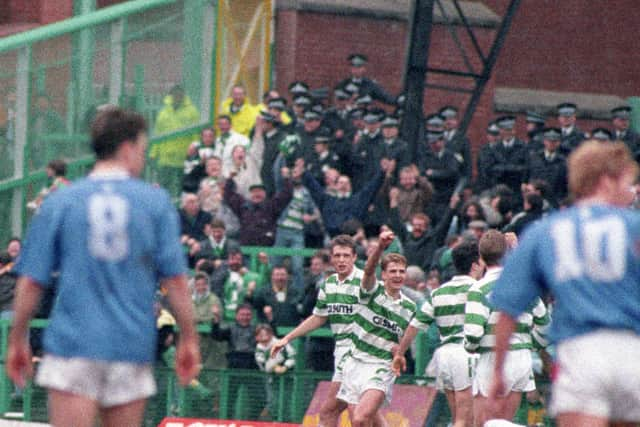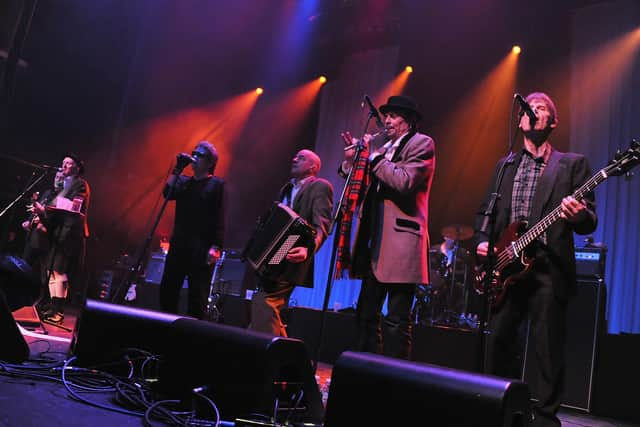When The Pogues saw Celtic beat 8-man Rangers in St Patrick's Day 'massacre'
In the eyes of many, it was scheduling nirvana. An overdue Celtic win over Rangers followed by the Pogues at the Barrowland Ballroom.
This would have been the recipe for high spirits on any day of the year but make it St Patrick’s Day and you have yourself the mother of all parties.
Advertisement
Hide AdAdvertisement
Hide AdPity the Rangers fan who happened to have acquired a taste for the Pogues, perhaps on account of their top-selling Christmas hit Fairytale of New York from four years earlier, and who headed to the Barras in the hope of taking their mind off the afternoon’s game.


Shane MacGowan and the band came on stage wearing Celtic scarves while carrying a banner pointing out in more expressive language than permitted here that there would be no Rangers fans at Hampden.
There were no Celtic fans either, not at the final at any rate. It was classic Celtic to beat Rangers one week, beat them again in the league the following week – aggregate score 5-0 – and then lose to Motherwell at home the week after that. They also lost the semi-final to the Fir Park side in a replay at Hampden to miss out on a cup final appearance. But already denying Rangers the opportunity to win the treble was ample compensation.
The game in which they did so took place exactly 30 years ago today, and is now known as the “St Patrick’s Day Massacre” by Celtic fans. Even by Old Firm standards, it was boisterous. Four players were red carded, including three from visitors Rangers – the highest tally since the war. The game was covered live by BBC Scotland, anchor Dougie Donnelly observing: “this was not the kind of cup tie anyone wanted to see”.
The next day’s papers included headlines such as “Shame Game” and “Black day for Scottish football”. Neither phrase reflected the feelings of Celtic fans as they left Parkhead laughing along in mocking fashion to the tune of the Rangers “Billy Boys” anthem, as was their wont then.


Rangers manager Graeme Souness, involved in what proved his penultimate Old Firm derby, was even moved to apologise for his team’s indiscipline afterwards, with Terry Hurlock, Mark Hateley and Mark Walters all seeing red for the Ibrox side. Peter Grant got the ball rolling when he was sent off for the hosts with Celtic already 2-0 up after a sweet finish from Gerry Creaney and a deflected free kick from Dariusz Wdowczyk.
“You are sitting alone in the dressing room with the big clock ticking just praying that we keep in front,” says Grant, speaking to The Scotsman earlier this week. Before long he heard three different sets of Rangers players’ studs clacking down the tunnel as Hurlock, Walters and then Hateley lost their composure one after another, with the game coming close to being abandoned. “I didn’t feel so bad!” he says.
On an afternoon when there was no shortage of memorable moments, this was the game that saw Hateley demand that referee Andrew Waddell come to him if he wanted to issue a booking for an elbow on Paul Elliott rather than the more conventional arrangement of the other way around.
Advertisement
Hide AdAdvertisement
Hide AdThere was an element of comedy when Grant was ordered off for a second bookable offence just moments after being yellow carded for clipping former teammate Mo Johnston as the striker burst through on goal.


“I felt like the boy from Zaire after it,” he says, with reference to the incident during the 1974 World Cup when Mwepu Ilunga propelled himself out of the wall and cleared a free kick before a Brazilian player had even taken it. Grant was not quite so far forward when Ian Ferguson’s free-kick struck him but he was certainly nearer than ten yards.
Still slightly frazzled after conceding the free-kick, he did not delegate the responsibility of ‘free-kick charger’ to someone else, the normal practice when he was already on a yellow card and sailing close to the wind. He did have the presence of mind to begin his run from slightly behind the wall but even then, he was practically inspecting Ferguson’s dyed roots by the time the Rangers player, who had taken a longer than usual run up, connected with the ball.
“I ended up being about two yards in front of the wall and I was praying for the ball to actually go by me,” says Grant.
It was the first and only time the midfielder was sent off in an Old Firm game. “Looking back, it makes me cringe actually. The bottom line is, if it is a bad or poorly-timed tackle or you save something on the line with your hand then fine, but you don’t want to be sent off for something like that,” he says.


Hurlock’s red card was for a more honest-to-goodness elbow into Tommy Coyne’s face while Walters received a second yellow for a tangle with the same opponent. Hateley was given his marching orders for an altercation with Anton Rogan on the touchline. The mayhem mirrored what had occurred four years earlier, in the last so-called 'Shame Game", when three players – two from Rangers, one from Celtic – were sent off in an Old Firm game that led to breach of the peace charges being brought against four participants, including then Ibrox skipper Terry Butcher. There were similar fears the police would get involved again.
It was just as well there was some sweet, soothing music at the Barrowland Ballroom in Gallowgate to calm everyone down later the same evening. Pogues accordion player James Fearnley remembers the song Repeal of the Licensing Laws going down a storm on a day when approximately 95 per cent of the 2000 fans inside the venue had taken advantage of being permitted to drink all day in Glasgow.
The Pogues had a habit of playing in the city on significant football occasions. They were at Barrowland the night after Jock Stein died in 1985 and dedicated “I’m A Man You Don’t Meet Every Day”, from their classic Rum, Sodomy & the Lash album, to him amid outbursts of “Jock Stein! Jock Stein!” chants from the crowd. On this latest occasion, they brought on stage Gerry Conlon and Paddy Armstrong, half of the Guildford Four, to increase the fervour - the Birmingham Six had also been released just a few days earlier. The Pogues had written a subsequently banned song about the plight of these wronged prisoners.
Advertisement
Hide AdAdvertisement
Hide Ad“We had got into this minibus after the game and we drove through this mob of Rangers fans, all with their scarves and colours,” recalls Spider Stacy, the tin whistle-playing founding member, one of several members of the band who visited Celtic Park for the first time that afternoon and watched the game from ‘the Jungle’.
“Gerry Conlon said to Paddy Armstrong: ‘lean out the window and give us a verse of the Bold Fenian Men, why don’t you?’ Paddy was not the kind of guy to cause trouble but duly stuck his head out of the window – and we were like: ‘Nooooo Paddy! Not just yet anyway – wait until we have some clear road ahead of us!’”
The band - and guests - made it to Gallowgate in tact. Only a matter of months before MacGowan, their inspirational front man, was forced out due to various lifestyle excesses, they played one of the gigs of their life.
“There was a palpable atmosphere before you’d even played a note,” recalls Fearnley from Vancouver, where his film producer wife, Danielle, is on location. “I don’t know how Glasgow manages to do that – it just does.” In his well-received memoir Here Comes Everybody, Fearnley describes a typical Barrowland crowd – “laced together by green and white Celtic scarves” – when the Pogues were in town.
“They scared the shit out of me,” he writes. “I was relieved that these lads – there weren’t many girls out there – were on our side. I pitied those who weren’t.”
A message from the Editor:Thank you for reading this article. We're more reliant on your support than ever as the shift in consumer habits brought about by Coronavirus impacts our advertisers.If you haven't already, please consider supporting our trusted, fact-checked journalism by taking out a digital subscription https://www.scotsman.com/subscriptions
Comments
Want to join the conversation? Please or to comment on this article.